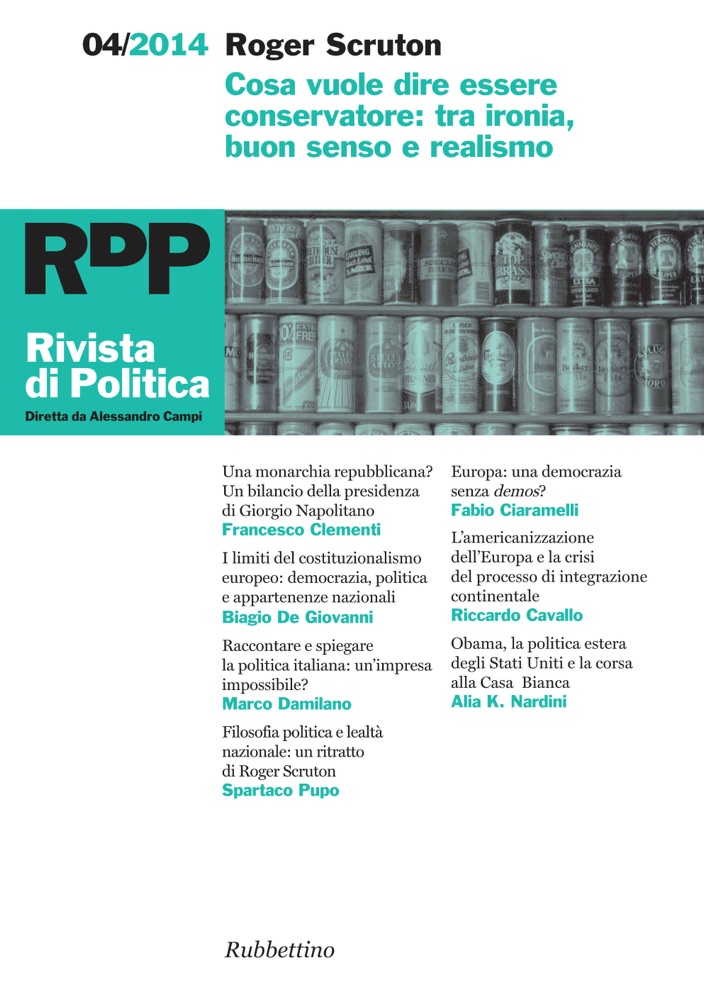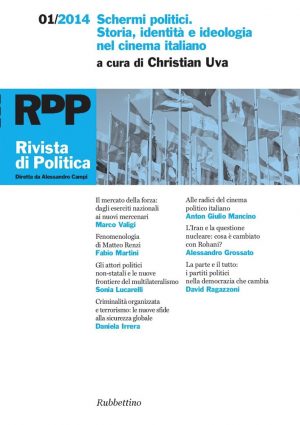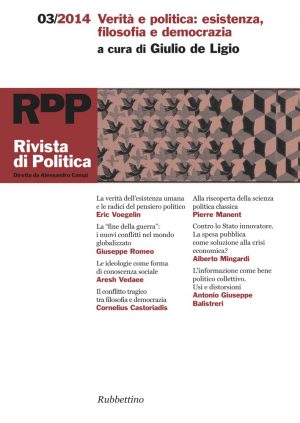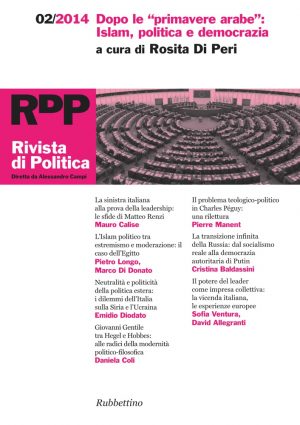04/2014 – Roger Scruton. Cosa vuole dire essere conservatore: tra ironia, buon senso e realismo
ISSN: 2037-495X
8,50€ – 11,00€
Descrizione
Sommario:
congetture e confutazioni
Una monarchia repubblicana? Un bilancio della Presidenza Napolitano, Francesco Clementi
La montagna ha partorito il topolino? Un bilancio del semestre italiano di presidenza dell’UE, Luigi Di Gregorio
Tra scena e retroscena. Come i media raccontano i leader: il caso italiano, Marco Damilano
Gli Stati Uniti al voto: le elezioni di midterm e la corsa per la Casa Bianca, Alia K. Nardini
La necessità di rilanciare la politica energetica nazionale, Andrea Falconi
dossier: europa, democrazia e politica
Quale futuro per l’Europa
Per una critica del costituzionalismo europeo Biagio De Giovanni
Quo vadis Europa? Ascesa e declino dell’eccezionalismo Antonio Cantaro
Europa depressa. Appunti sull’odierna crisi dell’integrazione europea Fabio Ciaramelli
L’euroscetticismo antitedesco Gabriele D’Ottavio
Il gabinetto del dr. Kojève. L’Europa, l’Impero Latino e il kgb Marco Filoni
Theatrum Europaeum. Guerra, politica e diritto Riccardo Cavallo
l’inedito: roger scruton
Prendersi cura delle istituzioni. Il conservatorismo politico di Roger Scruton Spartaco Pupo
Breve storia di un conservatore al servizio della nazione Roger Scruton
Come essere antisocialisti, non liberali e conservatori Roger Scruton
Abstracts
…
Biagio de Giovanni, A criticism against European constitutionalism
The European Union is divided between a supranational legal community and a number of political communities still pertaining to the nation states that are part of the UE. The relationship between legitimacy and legality, on which the modern European democracy rests, is now faltering. Sovereignty, broken in its unity, suffers from this. The reaction to this critical situation, adopting a European constitutionalism – the so-called “multilevel constitutionalism” – is inadequate. By absorbing people in citizenship, it creates a constitutionalism without people in a historical phase in which the emphasis of a systemic crisis is turning into a real democratic crisis.
Antonio Cantaro, Quo vadis Europa? The rise and fall of European Exceptionalism
The EU seems to have entered a new phase of the economic crisis. Being questioned is the “finalité” itself of the integration process: not only the monetary integration (undoubtedly the most striking in material and symbolic terms), but also the policy of enlargement, the economic and legal integration, the social integration (the European social model). This essay argues that the Union should challenge the globalization process, defending the fundamental principles and institutions of the welfare state and the European legal tradition of the rule of law and constitutional state. On the contrary, the EU seems to favour a passive integration in the international markets in direction of a sort of “americanization” and “Westernization” of Europe.
Fabio Ciaramelli, Depressed Europe: Notes on contemporary crisis of European integration
The most troubling factor in the current crisis of European integration is no longer the inadequacy of democratic participation. After 2008, the deep-seated motivation of the project of European integration, which was the drive itself of economic development, seems to have used up its force. Therefore, the only way to give a new impulse to the European strategy is to stress its cultural and political motivations. The turning point of such an approach to European integration implies a new consideration of its potentiality beyond any realistic analysis of the forces at play.
Gabriele D’Ottavio, Anti-German Euroscepticism
An Anti-German Euroskepticism is on the rise. The Euro crisis and the austerity policies which indebted states were forced to adopt have triggered, at least temporarily, a further deterioration of the living standards in these countries, and have led to fierce protest by the affected populations not only against European policies but also against Germany. This article will first illustrate the “Antigerman Euroscepticism” in Italy during the last two election campaigns, in 2013 and 2014. It will point out the peculiarity of the Italian case by arguing that the origins of the Italian feeling of malaise towards Germany’s European role are at once political and historical. It will then take a close look at the German Euro-area crisis management, by explaining its wider and somehow contradictory consequences produced on the German political system. Finally, it will discuss the broader meaning of this new phenomenon, the Anti-German Euroskepticism, by taking into account both the Italian and the German perspective.
Marco Filoni, The Cabinet of dr. Kojève: Europe, the Latin Empire and the KGB
Alexandre Kojève, a maverick thinker of the twentieth century philosophical context, not only dealt with Europe in his study, but was also practically committed to its construction working as a high official in the French Foreign Affair Ministry. After all, it is difficult to understand his philosophical elaboration on Europe (especially starting from the text on the Latin empire, written in 1944 and updated the following year) without taking in to consideration the biographical aspects: the Resistance during the war and his relations with the Vichy regime; his keeping in contact with Russia, where he was born; the tabloid-style rumours (mainly baseless) about his alleged role of a KGB spy; the proximity with some important personalities of the political life in France (Robert Marjolin, Raymond Barre and others). This article aims at recreating and explaining for the first time – through unpublished and archive documents – the complicated plot in which Kojève was acting as a protagonist.
Riccardo Cavallo, Theatrum Europaeum: War, Politics and, Law
This article focuses on the burning issue of the future of Europe and its philosophical-juridical and political implications in the today’s challenging and globalized world. With this aim in view, first of all, it will question the real roots of European identity, recalling some significant stages of European history (i.e. the beginning of the First World War and the fall of the Berlin Wall), arguing that war, rather than peace and harmony between its people, is a sort of “genetic makeup” of Europe as well as of Western civilization. Secondly, the article will analysed the role of Europe by retracing its economic choices in the New Capitalistic Deal (so-called Financial Capitalism) in order to discover the new face of war (economic war). In conclusion, in the thorny pathway of the construction of the European Union, paraphrasing a well-known Clausewitzian claim, war (traditional, humanitarian, technological and, more recently, economic) is the continuation of politics by other means.
Spartaco Pupo, The care of institutions: Roger Scruton’s political conservatism
This paper focuses on the main issues of Roger Scruton’s conservatism, from the attempt to overcome the “culture of repudiation” inaugurated by Michel Foucault, to the rediscovery of Burkean prejudice as “latent wisdom”; from environmental “conservationism”, to the recognition of political identity as a reality based on the relationship of citizens with the symbols of membership, authority and identification with “nation”. Scruton explores conservatism as social attitude, idea of government and political practice. All these constituent elements are informed by a skepticism towards the prospects of radical change, utopian theories and liberal and socialist ideas on the human nature and institutions.
Roger Scruton, How to be a Non-Liberal, Anti-Socialist Conservative
Post-war intellectuals have inherited two major systems of political thought: liberalism and socialism. Each of these proposes an ideal solution to our condition in terms that are secular, abstract, universal, egalitarian, “desacralized” and corresponding to no lasting common human experience. According to the author of this essay, the first task of conservatism, as a legitimate counterpart to these two political doctrines, is to create a language in which “conservative” is no longer a term of abuse, and to give back to politics its true meaning: a form of association which is not a means to an end, but an end in and of itself, and in which men live not by universal aspirations but by local attachments and national loyalties.
Roger Scruton, A short history of a conservative thinker in defense of national identity (lecture in Brno)
This is the text of a lecture delivered at Masaryk University, Brno, Moravia, on the occasion of Roger Scruton’s sixtieth birthday, in 2004. Scruton remembers the most important moments of his intellectual life and talks about his conservative instinct that was sharpened during the Paris riots of 1968 and his sickness for the literature that inspired the French youth. He speaks of his direct knowledge of the communist regime during his stay in Czechoslovakia, in 1979, and of his clandestine meetings with dissident intellectuals who were fighting for freedom, putting into practice the principles of their conservative culture, imbued with the spirit of place and community.






